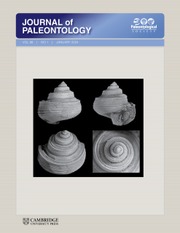Susan Kidwell is the leading authority on the taphonomy of shelly invertebrates, the processes that determine the nature of most of the marine fossil record. Her research lies at the interface of paleontology, sedimentology, stratigraphy, paleoecology, and conservation paleobiology. She has transformed taphonomy from a field concerned with information loss to one that exploits shells as a critical source of biological and sedimentological information. She was a pioneer in the geosciences, gaining her first academic position at the University of Arizona in the early 1980s straight out of graduate school, when women were less than 20% of PhD graduates in the discipline and just a small fraction of faculty. She joined the University of Chicago in 1985, where she is now the William Rainey Harper Professor in the Department of Geophysical Sciences. She has published about 100 papers, including a series of major reviews of the contributions of taphonomy to paleobiology. She has been elected to the American Academy of Arts and Sciences and the American Association for the Advancement of Science, and has received the Schuchert Award of the Paleontological Society, the RC Moore Medal of the Society for Sedimentary Geology, and the Mary Clark Thompson Medal of the US National Academy of Sciences.
Susan Kidwell's research is characterized by extraordinarily careful and detailed studies of fossil and living environments, complemented by focused experiments. Following her graduate work on the Miocene sequences of the Atlantic Coastal Plain, she developed models for fossil concentrations, showing how sedimentation rather than skeletal input is the main control on the nature of the fossil record. Her insights revealed the potential of shell beds as markers in sequence stratigraphy. She showed how taphonomic experiments, both in the lab and field, can illuminate the factors controlling the destruction of skeletal material. She revolutionized our understanding of the relationship between live and dead assemblages showing how time-averaged assemblages generally provide a more comprehensive picture of diversity than live communities, allowing us to use them to gain fundamental insights in paleoecology and conservation biology. She analyzed the impact of shell chemistry on the completeness of the fossil record and its effect on the evidence for evolution through time. She pioneered the use of meta-analysis, applying statistical methods to synthesize the results of many studies by herself and others. Her taphonomic research has been central to the integration of fossil and stratigraphic data and their application to the analysis of paleoecological and macroevolutionary patterns.
In constant pursuit of new questions and novel sources of data to address them, Susan Kidwell has become a leader in the new field of conservation paleobiology, extending her taphonomic insights to modern-day coastal and estuarine ecosystems and even terrestrial settings. By showing that discordance in the composition of live communities and death assemblages usually derives from recent ecological change rather than from taphonomic bias, she has shown how the young fossil record reveals base lines—evidence for diversity before an environment was subjected to factors such as urban pollution and climate change. Identifying the impact of human activities in the past provides a basis for developing conservation strategies for modern marine habitats.
Susan Kidwell has promoted our science in many ways—on advisory boards and working groups at the National Science Foundation, the National Research Council, and the National Center for Ecological Analysis and Synthesis, and as Councilor for our own society and the Society for Sedimentary Geology. She has likewise served the University of Chicago, notably as chair of student advising of the Committee for Evolutionary Biology for 20 years. She is an influential educator and outstanding mentor and friend to her family of students. Experiencing firsthand (on sabbatical) the way that she and her colleagues foster a flourishing paleobiology group at the University of Chicago was an inspiration to me, and no doubt others, as I tried to create something similar at her own alma mater. It is no surprise that Susan has been very successful in placing her graduate students and postdocs, women in particular and also men, in positions as environmental scientists, researchers, and professorships.
It is an honor to present Susan Kidwell as the 2020 Paleontological Society Medalist.
October 26, 2020



